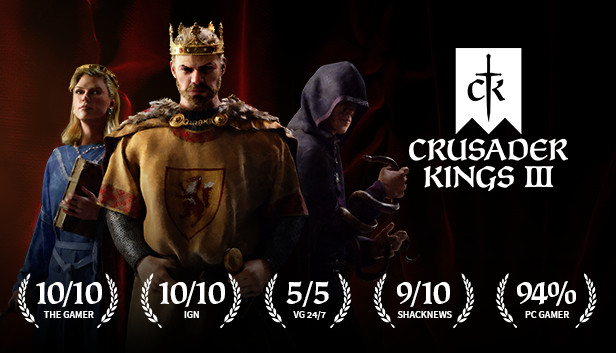Most players start Crusader Kings 3 with a big ol’ bucket of paint and try to completely cover the map in the colour of their nation as fast as possible. Due to the need to expand, it is often times very easy to overlook or even ignore the idea of taking a break to develop your Holdings.
An interesting playstyle from previous Paradox games is the idea of playing “Tall” instead of “Wide”. The overall gist is that you dedicate all of your efforts in building up a small number of Counties/Duchies to create a highly advanced core province that provides a ton of money and levies. The process to this involves strategically constructing buildings, improving development, maintaining land upon succession, and rapidly researching technology.
This guide today will go over some of the most important tips and tricks to playing Tall in Crusader Kings 3. See our other Crusader Kings 3 Guides for more information on how to get started if you are a new player.
1. Prioritize Gold and Development Buildings
Prioritizing gold at the start of the game helps speed up how fast you can construct buildings in your Counties. Generally you want to aim for the largest gold amount and work your way down the list of available buildings. Some are locked to certain terrain types (e.g. you won’t have farms in a mountainous terrain), but there will definitely be a few that offer some gold boost.
Increasing development is also crucial to playing Tall due to its impact on both income and on research speed. One of the ways to stay ahead of your enemies is to advance research fast enough to outpace their income and levy growth. The boosts you receive from development may not seem like much at the start of the game, but once you unlock higher levels of development you will begin to see your income rise substantially.
Another bonus to keep an eye out for is the decrease in construction cost and construction time. Since you are heavily investing into more buildings, having a reduction in time and cost can go a long way to speeding up growth.
2. Select a Core Duchy with many Holdings
The entire idea of playing Tall is to focus only on a few Counties at a time. One of the easiest options to accomplish this is to focus entirely on one Duchy at the start of the game. Typically each Duchy will have at least 2-3 Counties that will usually take up all of your gold.
Each Duchy gives you a spot for a special building that provides substantial bonuses. One of the buildings that is recommended is the one that increases holding tax by 10% in only that Duchy. Improving all the Counties in that one Duchy with the bonus will optimize your gold gain.
There is an argument for hanging onto Duchy Capital Counties instead of being all centered into one Duchy. Doing this and building all of the special buildings with Realm-Wide bonuses to your army can increase your fighting power by a ton – but also makes it less efficient with increasing gold gain. Overall, focusing on one single Duchy becomes more efficient with the Tall playstyle and allows you to expand faster.
Final thing to note is that you should choose a starting character that has lands with a large number of holding spots. This ultimately determines your long term growth cap and how much space you have to expand in before needing to capture another County. Increasing the density of holdings will make your Tall gameplay go a lot smoother.
3. Improve Development with Steward
Although stewards can be used to increase your gold income, they are much better used in improving development. I usually just stick my steward onto my capital County and let them continuously increase my development. It is a very slow process and there typically isn’t too much of a reason to switch them off.
Like mentioned above, improving Development is more beneficial due to the increase in research speed. Development’s effect on income is not nearly as good as directly receiving gold using your Steward, but the end goal is to out-tech your opponents.
4. Focus Education on Stewardship or Learning
Stewardship and Learning are the absolute most essential stats to aim for when you are playing Tall in Crusader Kings 3. Stewardship and Stewardship Lifestyle Traits increase your gold income by a ton and is very much needed to sustain your construction. Learning is needed to increase your research speed – which in turn will improve your income and further development.
Both are essential, but the early game should be focused on Stewardship. Depending on your starting character, you may or may not be the Cultural Head. If you are not the cultural head, the Learning and research focus will not be as useful as the extra gold.
Once you are the Cultural Head and have a income of at least 9-10 gold, it may be a good time to consider switching to a Learning focus for educating your Children.
An alternative method is to merely choose an Education Focus that suits your child the best. Choose the higher of the two stats and also take into account the childhood trait as well. Compatible traits will improve the final quality of education that the child receives.
5. Secure a good Steward
A good Steward can speed up your Development growth and can also greatly increase your gold gain if needed. Securing a good one can sometimes be a little bit more complicated. Hitting “C” and trying to find a Steward can be difficult – especially since the ones with highest Stewardship may not have an interest in joining your Court.
One of the easiest methods is to constantly monitor the Court tab for new visitors. If you are a Duke, you should begin to have a few visitors trickling in that have decent Stewardship stats. However, this does take a bit more time and there is no promise of actually obtaining a good Steward.
The other method is to marry one of your daughters to the potential Steward that you found on the character finder. Playing Tall typically means that you will not be doing much expanding for much of the early game. Securing alliances for power and war-time allies is less important in this situation. Instead, marrying for a good Steward has a direct impact on how fast your realm develops and should be the optimal choice.
6. Avoid more than 2-3 Heirs
Playing Tall means that you will not be focusing on expanding your realm as much as playing Wide. A result of this is that you end up with fewer new Counties and Duchies that can be granted to your other children.
With that in mind, succession planning becomes much, much more difficult to handle. You will want at most 3 children who are in line to inherit. Any less and you run the risk of your heir dying and ending the game, but any more than 3 will result in definite issues with losing your valuable core counties.
Most common way to avoid this is to divorce and re-marry to an older stat-based character once you have your 3 possible heirs. Alternatively, you can also seek out the Celibate trait to reduce fertility. However, this method carries more risk and you should usually go with the divorce method.
Once you have only 2-3 heirs, you can either manage your succession as per our Succession and Inheritance Guide or just disinherit them once you are close to dying. The prestige cost is relatively easy to sustain since you will only have to use that function 1-2 times.
7. Forbid Heir from becoming a Knight
Fewer children means you have to be extremely careful about keeping your heir alive. The most common way that your characters die is in battle if they show up as a Knight. Even if your heir has 5 Prowess and is unlikely to be sent off, still go through the process of Forbidding them from becoming a Knight.
Likewise, it may be tempting to let your Heir be a Knight if they have 20 Prowess, but the risk is definitely still there – especially if you end up fighting a losing battle. Keeping your heir alive is the most important objective.
8. Marry for high Stewardship and set to “Manage Domain”
Whenever you marry, your spouse shows up on your Council and gives you a bonus to your stats based on theirs. Marrying someone with very high Stewardship and setting them to “Manage Domain” can add fairly large amount of Stewardship to your existing character. Higher stewardship increases your regular gold income and also allows you to hold onto more domains.
Keep in mind that domains also include the number of castles you can hold (and temples if your religion allows). Even if you are playing Tall, a higher domain limit means you can directly hold onto even more castles/temples. More holdings means more taxes and faster growth.
9. Ask for Gold from Head of Faith
Like mentioned in our Beginner Tips, asking the Pope for Gold is one of the easiest early game money making methods. All you need is 250 piety and a decent opinion from the Pope and you will receive a healthy sum of gold (usually between 125-250ish).
The downside to this is that you do end up losing quite a bit of piety. However, playing Tall means that you really don’t need a lot of it since you won’t be waging many Holy Wars. Gold is infinitely more valuable to you in the early game and you should always ask for Gold whenever the option comes up.
10. Defend against Raids
This seems like a no-brainer, but you actually need to pay attention to your holdings if you are in an area that has raiders. The game does not pause nor slow down when you are getting raided and the results can be devastating.
Once your holding has been sieged down and looted, you get hit with a fat 50% reduction in income for several years AND a decrease in control. For someone playing Tall, losing even 1-2 holdings can be enough to cripple your growth for the next decade.
Always make sure to monitor your holdings when you set the game to higher speeds to make sure that you can raise your army in time to defend your land.
Another tip is to increase the fort level of your holding to give yourself more time. If you already constructed all of the gold buildings, it is a good idea to invest in the building that increases Fort level and provides increased garrison. Higher garrison count means the raiders need a much larger group to even begin the siege timer. Once you have started rapidly researching, the increase in garrison from these buildings can sometimes be enough to fend off the raiders altogether.
Protecting your assets is a much, much more important part of the game when you are playing Tall and should always be in the back of your mind.
11. Do not invest in Feudal Vassal Holdings
It is a complete waste of money and you won’t see any return on it. It takes several hundred gold for you to construct a building for your vassal – but the end result is they might pay you 0.1 more taxes (at 25% tax rate) if you are lucky. It would take you a ton more time to see any sort of return on this compared to if you saved up the money for your own holdings instead.
If you find that you are maxed out, then start working on another County to include in your core. There will always be better ways to spend your gold than to improve your feudal vassal holdings.
However, temple holdings can actually be a fairly decent investment if you have extra money. If you are in a Theocracy, the tax rate is approximately 50% for your Bishop as long as they have a good opinion of you. More on this will be discussed below.
12. Build Temples and Increase Bishop Opinion
Like mentioned above, Bishops give you 100% of levies and 50% of gold if their opinion of you is good. Temples have a higher max gold income than Castles and will not count towards your total Holding limit since they are held by the clergy.
With Castles you always run the risk of losing it to another child due to succession and will provide less gold at max. However, Temples will give you consistent income throughout the game and the Bishop can also improve the Temple on their own. As a long term strategy, building temples will pay off more and have less risk than creating Castle vassals.
Conclusion
Playing Tall in Crusader Kings 3 is a very satisfying experience once you are able to get it to work. The early game can be a little rough, but you will end up snowballing much harder once you have constructed a few buildings.
Thank you all for reading and I hope that this guide has been of some help for you!
See our other Crusader Kings 3 guides here for more information on how to start playing the game:
Crusader Kings 3 Beginner Tips
Crusader Kings 3 Succession and Inheritance Guide
Crusader Kings 3 Prestige and Piety Guide
Crusader Kings 3 Top 10 Tips for Starting as a Count
Follow us on Twitter and Facebook for updates on our guides and reviews



